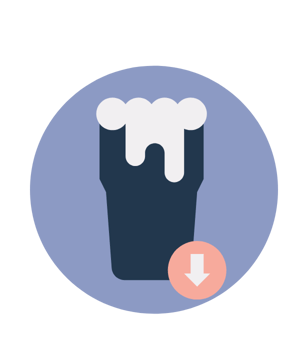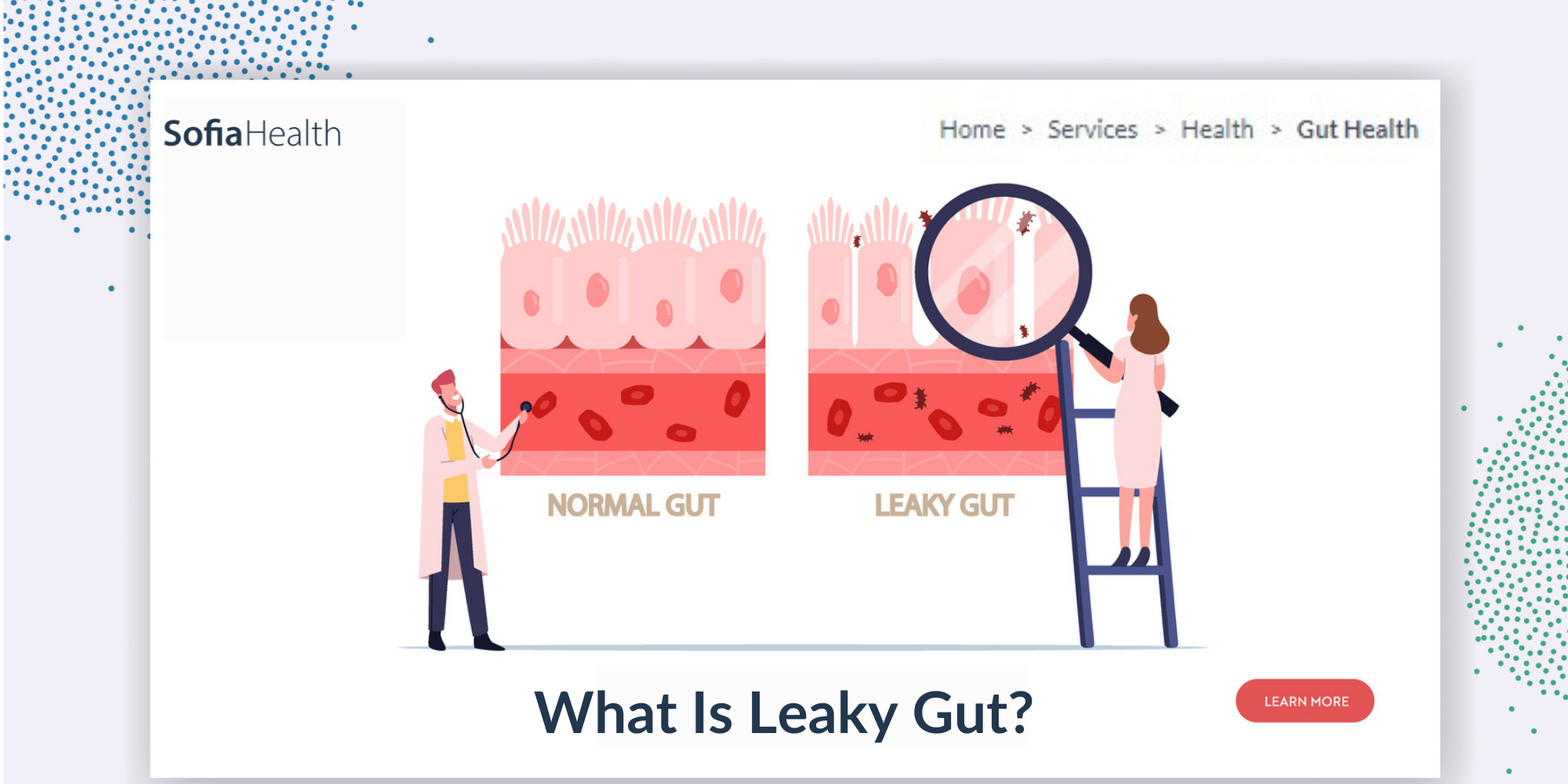Talking about having a leaky gut can be complicated. There's little concrete medical evidence that “leaky gut syndrome” exists, yet a leaky gut is known to be a symptom of some inflammatory and ulcerating conditions.
This guide will outline the symptoms and causes of leaky gut, what a leaky-gut-friendly diet looks like, and the other changes a person can make to help the leaky gut.
What Is a Leaky Gut?
Leaky gut occurs when the intestinal wall begins to let substances into the bloodstream more easily, including harmful ones. This increased intestinal permeability has been documented, and it can occur as one of the symptoms of many diseases. It’s unclear, though, whether it's a separate condition in its own right. If it is, this could also make it an underlying cause of chronic disease, rather than only a symptom.
As “leaky gut syndrome” isn’t an official diagnosis, doctors don’t have a clear and well-reported set of symptoms to work from. People with a leaky gut caused by other conditions report bloating, cramps, aches, gas, and food sensitivities. But these symptoms are shared by many other conditions. The problem arises because doctors are unlikely to diagnose “leaky gut syndrome” by itself. So, unless another definite cause is established, a patient may end up without treatment that helps.
What Causes Leaky Gut?
The intestinal lining is an effective barrier, stopping potentially harmful substances from entering the rest of the body. But it also contains small gaps (or junctions) that allow nutrients and water to be absorbed from the intestines and pass into the bloodstream. Intestinal permeability is the term for how easily substances can pass through these junctions.

The exact cause of a leaky gut is unknown. However, some chronic health conditions, such as celiac disease and type 1 diabetes, cause the junctions in the intestinal lining to widen. As a result, unwanted bacteria, toxins, and undigested food are able to enter the bloodstream.
Zonulin is the only protein known to regulate how tight the junctions in the intestinal wall are. Higher levels may loosen them, increasing intestinal permeability (1).
In some people, two factors are known to increase zonulin levels: gluten and bacteria (2). Consistent evidence has shown that gluten can increase intestinal permeability in people with celiac disease (3). Studies on people with non-celiac gluten sensitivity, though, have shown mixed results (4). This protein can be tested with an at-home test kit from KBMO Diagnostics. To get more information on the test kit and purchase, view the Zonulin test kit on SofiaHealth.
Low levels of healthy gut bacteria may also increase intestinal permeability; this is called gut dysbiosis (5). Additionally, there’s evidence that inflammatory mediators (6, 7) or long-term use of nonsteroidal anti-inflammatory drugs (NSAIDs) (8) can also contribute to leaky gut.
Foods to Eat
There’s no medically recommended “leaky gut diet.” As increased intestinal leakiness is often thought to only be a symptom of other conditions, there are no specific diets. But eating a balanced diet is key.
There is some evidence the intestinal barrier can be fortified through diet (9). This includes supplementing with:
- Vitamin A
- Vitamin D
- Zinc
- Glutamine
- Methionine
- Probiotics
- Short-chain fatty acids
Eating a diet that improves overall digestive health can safeguard against developing a leaky gut, as it can help prevent other conditions from worsening.
Healthline recommends these foods to include in a leaky gut diet:
- Fermented vegetables: Sauerkraut, kimchi, tempeh, miso
- Cruciferous vegetables: Cabbage, broccoli, kale
- Root vegetables: Carrots, potatoes, beetroot, squash
- Fruit: Bananas, coconut, grapes, berries
- Healthy fats: Extra-virgin olive oil, avocado, avocado oil
- Gluten-free grains: Rice (brown and white), buckwheat, gluten-free oats, amaranth
- Sprouted seeds: Sunflower seeds, flaxseeds, chia seed
- Fish: Tuna, salmon, herring, other omega-3-rich fish
- Raw nuts: Peanuts, almonds
- Nut-based products: Coconut milk, nut milk
- Some meats: Lean cuts of chicken, turkey, beef, lamb
- Cultured dairy products: Yoghurt, Greek yogurt, kefir, traditional buttermilk
- Natural flavorings: All herbs and spices
- Drinks: Certain teas, kombucha, bone broth, water
Foods to Avoid
A person can also improve their gut health by avoiding certain foods. These are generally foods that:
- Cause inflammation in the body, which may encourage the growth of unhealthy gut bacteria linked to chronic diseases like cancers, heart disease, and type 2 diabetes (9)
- Trigger digestive symptoms, like bloating, diarrhea, and constipation
- Weaken the intestinal barrier because they contain certain types of fat, bile acids, emulsifiers, and gliadin (10)
Here are the main foods to steer clear of when looking to improve intestinal health:
- Wheat-based products: Bread, cereals, pasta, wheat flour
- Grains that contain gluten: Seitan, oats, barley, bulghur
- Savory baked goods: Pizza, pastries, pies
- Sweet baked goods: Cakes, cookies, muffins
- Artificial sweeteners: sucralose, aspartame, saccharin
- Refined oils: Sunflower, canola, safflower, soybean
- Processed meats: Bacon, deli meats, cold cuts, hot dogs
- Snacks: Crackers, muesli bars, pretzels, popcorn
- Junk food: Fast food, potato chips, candy bars
- Non-cultured dairy products: Milk, cheese, ice cream
- Drinks: Alcohol, carbonated drinks, other sugary beverages
How to Improve Your Overall Gut Health for Improved Health and Immune System Support
Besides diet, there are other lifestyle changes a person can make to improve overall gut health.

Reduce stress: Chronic stress is known to harm beneficial gut bacteria. Changing lifestyle stressors and doing activities like yoga or meditation can reduce stress (11).
There are many ways to reduce chronic stress. Find a modality that is right for you. From journaling to breathwork classes, on Sofia you can book private sessions or take group classes with the top health and wellness practitioners.

Take a probiotic supplement: Probiotics contain beneficial bacteria and naturally occur in fermented foods. Supplements may help if a person doesn’t get enough probiotics through their diet (12).
Need help finding the supplements that are right for you? Find a provider that is certified in supplement recommendations. Shop probiotic supplements on Sofia.

Get quality sleep: A lack of sleep can cause poor distribution of healthy intestinal bacteria. This may increase intestinal permeability (13).
Do you need help getting a restful night of sleep? Did you know that there are professionals who can help?

Quit smoking: Cigarettes put smokers at higher risk for several bowel conditions and cause inflammation in the digestive tract. Quitting smoking can increase the healthy gut bacteria and reduce harmful bacteria (14).
Need help with smoking cessation? Have you tried Reiki? Or NLP? There are modalities you might not have considered, visit Sofia to find all the ways you can get support.

Limit alcohol consumption: Excessive alcohol intake may increase intestinal permeability as the substance interacts with certain proteins (15). Alcohol can also affect your ability to get quality sleep!
How Can Sofia Health Help?
If you’re struggling with digestive symptoms, Sofia Health is a great resource with connections to many wonderful practitioners. Reach out to Sofia today and access a global community of providers who take a 360-degree approach to your health.
(1) PubMed: “Zonulin, regulation of tight junctions, and autoimmune diseases”
(2) PubMed: “Host-dependent zonulin secretion causes the impairment of the small intestine barrier function after bacterial exposure”
(6) ScienceDirect: Inflammatory Mediator.
(8) PubMed: “Intestinal permeability in the pathogenesis of NSAID-induced enteropathy”
(9) PubMed: “Beneficial Microbes: The pharmacy in the gut”
(10) PubMed: “What is the leaky gut? Clinical considerations in humans”
(11) PubMed: “Stress & the gut-brain axis: Regulation by the microbiome”
(12) PubMed: “Probiotics and microbiota composition”








